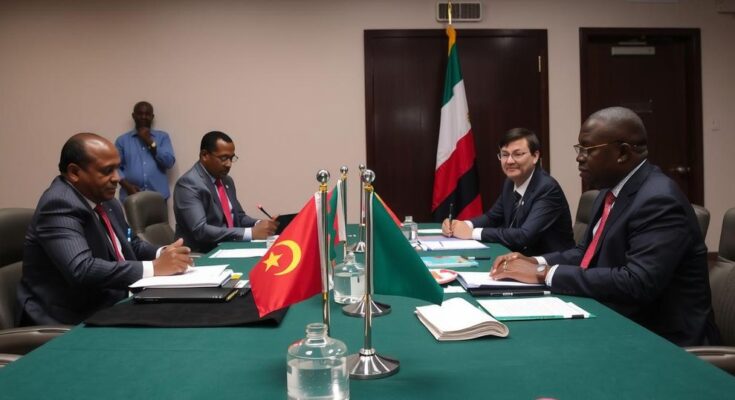On December 14, 2017, Somalia’s Minister of Foreign Affairs, Ali Omar, led a delegation to Addis Ababa to reinforce the Ankara Agreement signed between Ethiopia and Somalia. This agreement, aimed at promoting regional peace, allows Ethiopia access to maritime routes while recognizing mutual sovereignty. The visit emphasizes Somalia’s commitment to bilateral relations and reflects a broader goal of cooperation in the Horn of Africa.
On December 14, 2017, a delegation led by Ali Omar, Somalia’s Minister of Foreign Affairs and International Cooperation, visited Addis Ababa to bolster the commitments established in the Ankara Agreement. This visit underlines Somalia’s dedication to enhancing its diplomatic relationship with Ethiopia, as outlined in discussions previously held under Turkish President Recep Tayyip Erdoğan’s patronage. The Somali Ministry of Foreign Affairs reiterated its intent to deepen bilateral relations between the two nations in light of this significant agreement.
The Ankara Agreement, which was signed on December 2, 2017, between Ethiopian Prime Minister Abiy Ahmed and Somali President Hassan Sheikh Mohamud, aims to foster cooperation and peace in the Horn of Africa. This landmark initiative has been recognized by President Erdoğan as a historical stride towards regional stability, facilitating Ethiopia’s access to a reliable maritime outlet, which is crucial for its economic development as a landlocked nation. Prime Minister Abiy Ahmed stressed the importance of peaceful dispute resolution, emphasizing that Ethiopia’s endeavors should not be viewed with suspicion, but rather in a spirit of collaboration.
The ongoing diplomatic engagement signifies renewed efforts by both countries to strengthen ties based on sovereignty, mutual respect, and shared interests. Somalia’s Ministry of Foreign Affairs has underscored its commitment to improving relations with its neighbors while moving beyond previous conflicts, which had included tensions related to Ethiopia’s arrangements with Somaliland. The two nations now prioritize constructive dialogue and mutual prosperity, signaling a shift towards cooperative ties in the region.
The Ankara Agreement contains several key provisions that reflect the mutual commitments made by both nations. They include respect for sovereignty and territorial integrity, a constructive partnership aimed at overcoming historical differences, acknowledgement of the sacrifices made by Ethiopian soldiers in the African Union mission, ensuring Ethiopia’s maritime access under Somalia’s sovereign authority, and a mutual agreement to engage in technical negotiations facilitated by Turkey starting in February. Furthermore, Turkey’s involvement in mediating any disputes related to the agreement was formally accepted by both parties.
International interest in this agreement remains high as it addresses the stability and economic prospects of the Horn of Africa. Recently, French President Emmanuel Macron voiced his support for Ethiopia’s pursuit of a maritime gateway through dialogue, reinforcing the need for adherence to international law. The successful implementation of the Ankara Agreement may set a precedent for resolving regional conflicts while promoting economic cooperation, signaling a transformative phase for Ethiopia and Somalia moving forward.
The commitment to dialogue, respect, and mutual benefit is poised to significantly strengthen not only the bilateral relationship between Ethiopia and Somalia but also regional cooperation, fostering a climate of peace and prosperity in the Horn of Africa.
The Ankara Agreement represents a historic milestone in Somali-Ethiopian relations, offering a platform for cooperation in a region historically plagued by conflicts and territorial disputes. Signed in December 2017, amidst increasing regional tensions, the agreement primarily facilitates Ethiopia’s need for a maritime route necessary for trade and access to international markets, a crucial step for its economic development as a landlocked country. This agreement also underscores Somalia’s role in acknowledging Ethiopia’s military contributions and suggests a diplomatic reset between the two nations, aiming for a collaborative approach in resolving past grievances.
The visit of Somalia’s delegation to Addis Ababa demonstrates a significant commitment towards strengthening bilateral relations, reaffirming key provisions of the Ankara Agreement. As both nations work towards realizing this agreement, the focus on respect, cooperation, and peaceful resolutions heralds a new era for the Horn of Africa, fostering regional stability and economic collaboration. The international support surrounding these developments highlights the ongoing importance of dialogue in achieving peace and mutual prosperity.
Original Source: addisinsight.net




